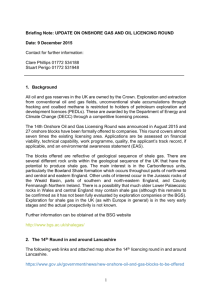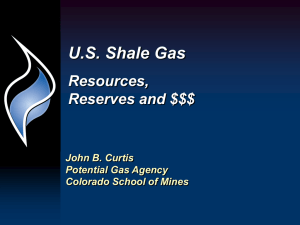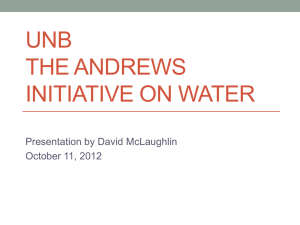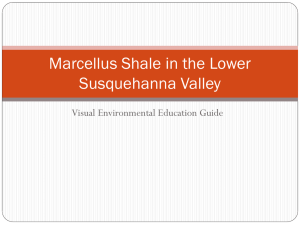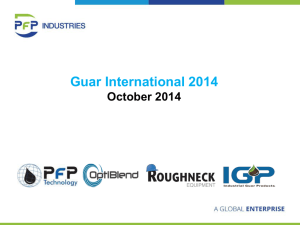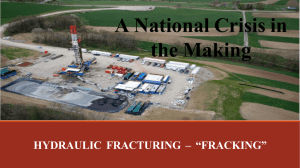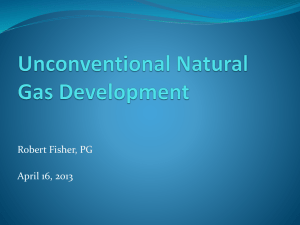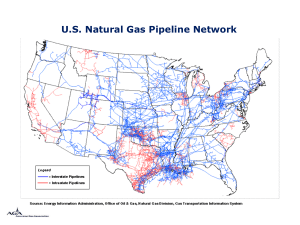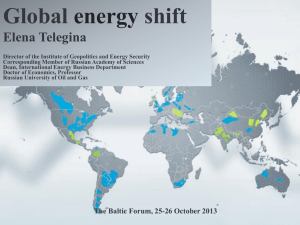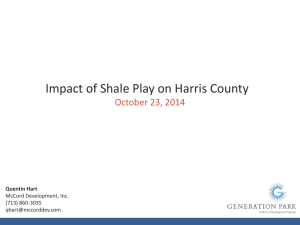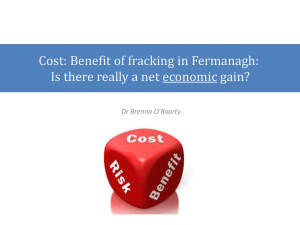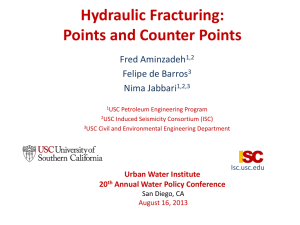Shale gas and hydraulic fracturing: EU member states* response
advertisement
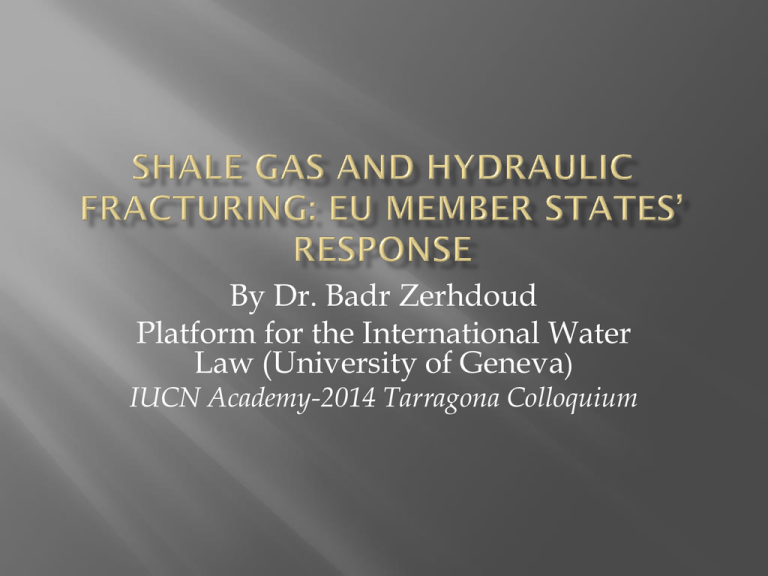
By Dr. Badr Zerhdoud Platform for the International Water Law (University of Geneva) IUCN Academy-2014 Tarragona Colloquium Many European states are more and more willing to produce shale gas (the US is now having access to a cheaper source of energy) to decrease its heavy dependency on imports (Russian gas for instance). Therefore, the European experience was until now mainly of low-volume hydraulic fracturing in conventional and tight gas reservoirs The environmental concern is at the very origin of a cautious approach with respect to this technique in most countries France Germany Spain UK Law n° 2011-835 was adopted on 13 July, 2011 and entered into force on 14 July, 2011. This law forbids “the exploration and exploitation of liquid or gaseous hydrocarbons through hydraulic fracturing” and enables the Government to abrogate “research permits which include projects using hydraulic fracturing“. (http://www.legifrance.gouv.fr/affichTexte.d o?cidTexte=JORFTEXT000024361355&categorie Lien=id) The article 2 of the Law N° 2011-835 established a Commission in order to deliver an opinion on the conditions of implementation of research-oriented experimentations. In the context of prohibition, this commission is the only body that could allow an operator to use HF, for the sake of “scientific research”. For the permits granted before the law, Article 3 further provides that if such a report states the operator will or might use HF, the permit will then be cancelled. France is the first country in the world to officially ban the use of HF in exploration and mining research and projects. Français Hollande indicated that this ban will remain in place throughout his presidential term. The Federal Government of Germany was until recently discussing whether shale gas production and the associated application of hydraulic fracturing operations should be permitted in Germany and if so, under which conditions. A Study of the Federal Ministry for the Environment, Nature Conservation and Nuclear Safety (BMU) and the Federal Environmental Agency (UBA) on the environmental impact of shale gas development were presented in August 2012 The study called for a very careful and limited exploration of shale gas in Germany that is accompanied by intensive administrative and scientific supervision by environmental authorities, including: An environmental impact assessment is required for any shale gas activity that includes hydraulic fracturing the availability of a wide range of information the participation of the public Source: http://www.umweltbundesamt.de/publikationen/environme ntal-impacts-of-fracking-related-to The German Minister of Economy (Sigmar Gabriel) is ready to submit to the Bundestag a Government’s proposal to regulate shale gas exploitation before this summer break. (cf New York Times, June, 5th 2014, http://www.nytimes.com/2014/06/06/busine ss/international/germany-may-turn-tofracking.html?_r=0) Traditionally, Spain imports 99% of its oil and gas consumption Discovery of significant offshore deposits, and prospects for fracking in Cantabria (North), Canary and Balearic Islands (boost by 35% of demands for prospection since 2012) Tension between Madrid and some regions (Aragon, Asturias, Basque Country and Cantabria) which adopted prohibition on shale gas: environmental concerns were here exacerbated by some earthquakes in the Valencia coast caused by a gas storage facility The Law 34/1998 1998 on oil and gas exploration was changed to specifically include the water-intensive drilling technique Law 21/13 (9th December 2013) It includes a mandatory environmental impact assessments (EIAs) for all shale gas projects including exploration. Thus, permits should be granted by the Ministry of Agriculture, Food and Environment Source: http://www.shalegasespana.es/es/index.php/prensa/b log/entry/industria-sometera-todos-los-proyectos-defracking-a-evaluacion-de-impacto-ambiental-1 In the light of its massive shale gas reserves that will smoothly compensate the loss of its conventional gas ones in the North Sea, the government lifted a temporary moratorium on shale gas in December 2012 (seismic activity near Cuadrilla’s drilling site in Blackpool, in the North West of England in April/May 2011). The Royal Society and the Royal Academy of Engineering concluded that shale gas could be managed effectively in the UK as long as « operational best practices are implemented and enforced through regulation ». Public Health England’s report into the health impacts of shale gas concluded that « the risks to public health from exposure to emissions from shale gas extraction are low if operations are properly run and regulated » Creation of the Office of Unconventional Gas and Oil (OUGO) which aims to: Make the most of existing natural resources Ensure local communities benefit from development in their area (£100.000 per extraction shaft+ 1% of profits) Enable development, protecting the environment and safeguarding the public Ensure regulation, including the planning and permitting processes, is as simple as possible through all phases (exploration, appraisal, development and full production) Ensure policies are in place for safe decommissioning of sites and high quality restoration of the land Source: https://www.gov.uk/government/groups/office-of- unconventional-gas-and-oil-ougo Thus, the UK government put in place a new regulatory framework to encourage shale gas exploitation: tax incentives (30% rate for profits raised from shale gas instead of 62% for conventional oil and gas exploitation) Ring-fence expenditure supplement (RFES) which allows the operator to increase the value of some its financial losses (around 10% per year) The government is considering the possibility to set up Future generations fund (Norway), that would allow transition to a low carbon economy (cf. Edward Davey, Secretary of State, for Energy and Climate Change, 9 September 2013 ). Besides, the UK Onshore Operators Group (UKOOG) launched guidelines and best practises related to the shale gas exploration and exploitation Source: http://www.ukoog.org.uk/onshoreextraction/industry-guidelines Some questions remain open: Is the Member State or the European Commission the most appropriate decision making level for the environmental standards? Should there be a common framework for landowners’ remuneration? To what extent a common European legislation on environmental issues regarding fracking could foster competition in a national based development? A very diverse regulatory framework regarding shale gas and HF in the European countries A need for a European harmonized answer, through the European Commission, to regulate the exploration and subsequent production of shale gas
